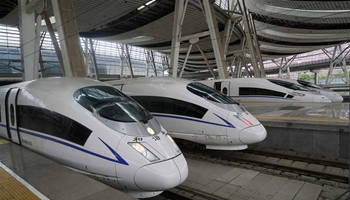BEIJING, July 22 (Xinhua) -- The following is the full text of the joint press release of China's Premier Li Keqiang, World Bank Group President Jim Yong Kim, IMF (International Monetary Fund) Managing Director Christine Lagarde, WTO (World Trade Organization) Director-General Roberto Azevedo, ILO (International Labor Organization) Director-General Guy Ryder, OECD (Organization for Economic Cooperation and Development) Secretary-General Angel Gurria and FSB (Financial Stability Board) Chairman Mark Carney on the occasion of their meeting in Beijing, July 22nd 2016.
The global economy is sluggish and faced with downside risks and uncertainties. Recently, the IMF has lowered slightly its global growth forecast and flagged rising downside risks arising from higher economic and political uncertainty and increased volatility in some market segments. The World Bank lowered its forecast for global economic growth in 2016, and emphasized the need for greater urgency in implementing structural reforms to counter stronger downside headwinds. The WTO has indicated uncertain near term global trade growth prospects and a challenging international trade policy environment with rising protectionist measures, despite some positive developments. The ILO expects the expansion of the global economy to be too weak to close the employment and social gaps left by the international financial crisis. The OECD has pointed to declining productivity trends and uncertainties besetting future global growth. The FSB has noted that global economic and financial difficulties were increasing and structural challenges became more pronounced. Against this backdrop, it is critical to enhance international economic policy coordination. Taking the opportunity of holding the G20 presidency this year, China is committed to fostering innovation and other new growth engines, deepening structural reform in particular on the supply-side, promoting investment and infrastructure development, implementing financial reform, advocating growth in trade, adding more and better jobs, advancing the 2030 Sustainable Development Agenda and addressing other global challenges, in a bid to achieving stronger, sustainable and balanced growth for the global economy. During this process, we welcome stronger policy communication and ongoing cooperation between China and the World Bank Group, the IMF, the WTO, the ILO, the OECD and the FSB in the relevant areas. China and international organizations participating in the Round-table (hereinafter referred to as "we") reached the following consensus:
1. On the macro economy. We recognize that aggregate demand will remain weak in the short run, and it will take time for supply-side policies to show effects, so a comprehensive package of policies are needed to strike a good balance between short-term and long-term goals. Strong, combined and coordinated efforts are needed, including use of all policy tools - monetary, fiscal and structural - to deal with risks and uncertainties in the world economy, safeguard financial stability and support economic growth. Monetary policy should continue to support economic activity and ensure price stability. Fiscal policy should be flexible to promote growth, job creation and confidence, while ensuring fiscal sustainability. Moreover, where fiscal rules and frameworks allow, fiscal policy should be used to support structural reforms while preventing and mitigating fiscal risks. Structural reforms should be tailored to country needs-including their income levels, cyclical positions, and available policy space-and operate along with other policies to support growth. Implementation of agreed financial reforms remains important to boost the resilience of the financial system. Well-calibrated and effective communication of policy stances will help to boost confidence, enhance policy effectiveness, and limit negative spillovers. China has taken the initiative to adapt to and guide the economic New Normal. While supporting aggregate demand, China continues to strengthen the structural reform, especially the structural reform on the supply-side, break a path for growth, accelerate the shift of growth models from emphasizing size and speed to quality and efficiency, and boost sustained driving forces for growth. Against the backdrop of global economic slow-down, China maintained steady growth during the first half of 2016, registering 6.7% year-on-year. Economic structure has been improved, and consumption and the service sector have become the major driving forces of the Chinese economy. The new economy featuring new technology, new products, new industries and new business models is growing rapidly, and industrial transformation and upgrading is advancing fast. We believe that the fundamentals of the Chinese economy remain positive in the long run. With deepening reforms, and implementing tasks of reducing overcapacity, destocking, deleveraging, reducing cost and shoring up weak spots, the Chinese economy will achieve strong, sustainable and balanced growth, and make a continuous contribution to global economic growth.
2.On structural reforms. We recognize the importance of structural reforms in dealing with the slowdown of global productivity growth and promoting steady, durable and inclusive recovery of global economy, which is also essential in realizing the ambition of the G20 Blueprint on Innovative Growth introduced by Chinese Presidency of G20. While country circumstances differ, there are shared directions of reform in general terms, including deregulation, enhancing competition, encouraging innovation, promoting fiscal reform, promoting trade and investment, strengthening the financial system, advancing labor market reform, improving infrastructure, enhancing environmental sustainability and promoting inclusive growth. The OECD and the IMF fully support the enhanced structural reform agenda as one of the priorities identified by Chinese Presidency of G20 this year. The international organization (IOs) also support G20 members' efforts in developing a set of priority areas and guiding principles for structural reforms, as well as an indicator system to further improve assessing and monitoring of the progress of structural reforms and their adequacy to address structural challenges, and welcome the substantial progress that has been made in this regard. The OECD, the IMF and other IOs will continue to contribute proactively to the work streams under the G20 Growth Framework, and tap into their expertise to provide valuable policy analysis and recommendations for G20 structural reforms. China will strengthen the cooperation with the IOs to jointly support the G20 plays an important role in further promoting the policy actions on structural reforms at both country and global level.
3.On innovation. We need to make efforts to foster new sources of growth such as innovation, new industrial revolution and the digital economy. We support the G20 developing action plans and guiding principles in these areas, and based on these working out the G20 Blueprint on Innovative Growth to foster new drivers of the growth of the world economy. We also encourage G20 Task Forces covering the above areas to continue their work in this regard in order to maintain continuity. Sound framework conditions and structural reforms are essential for rebalancing the Chinese economy and transitioning to a more sustainable, consumption-led and knowledge-based economy. On this basis, more efforts are needed to harness the development opportunities presented by the new industrial revolution and make more people benefit from it. Actions in the intertwined areas of innovation and the digital economy, including investing in the new technologies and skills in the direction of future development, can provide valuable support for new sources of growth -- boosting productivity gains, opening new markets, meeting unaddressed needs and tapping into new sources of human endeavor. Innovation is a key driver of productivity, growth and wellbeing: in a context of demographic change and diminishing returns on capital, it will become even more important in the future as a source of long-term growth, while digitalization is reshaping economies and offering new ways to spur efficiencies and improve services across all facets of life. The OECD will continue to support the delivery and implementation of an innovation-driven growth path.











